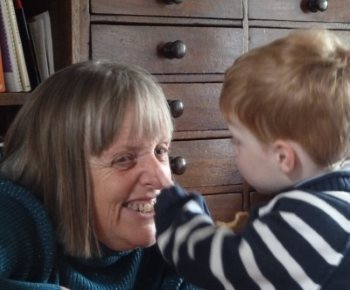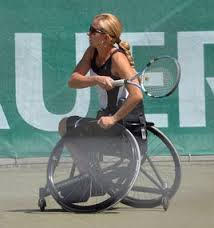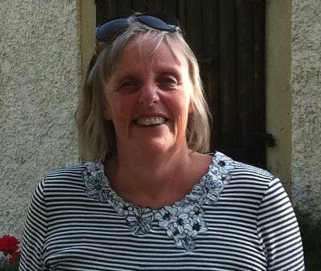Learning about disability – from my cousin and my course
March 12th, 2015 | Published in (Dis)ability, Guest posts
Guest post by Miranda Tooth
Winner 2020socialjustice student award 2014-15
My cousin has an intellectual disability. This is not how I think of her though. Instead, it’s her bubbly, enthusiastic and loving nature that first comes to my mind.
Sometimes I think the ability my cousin has to freely express love makes the rest of us look emotionally disabled. I wonder if she has labels for us, adjusts her behaviour around us, and pities us for our impaired emotional expression.
That’s Suzannah in the photo on the right, with her young nephew. She is delighted to have contributed to this article.
She helps me realise that when we value intellectual ability above other characteristics, it is our loss. We risk losing the eccentricity and diversity that makes our society rich.
Some of the things I have learnt about disability from her and also (more recently) from my combined degree course in psychology and social work are:
- Social exclusion is the main problem.
- We need to challenge our assumptions about people with disabilities.
- Identity is about more than (dis-)ability.
1. Social exclusion is the main problem
Over a lifetime, most of us will experience some impairment or disability. I, for example,  would not be able to do many of the activities I take for granted without the aid of contact lenses.
would not be able to do many of the activities I take for granted without the aid of contact lenses.
When we reflect on the various aids most of us use to increase our functioning, we can see that handicap is the result of the structures, systems and attitudes that exclude some people from full participation, rather than scores on IQ tests, mobility measures, or other indicators of ‘normal’.
2. We need to challenge assumptions
Working towards social inclusion of people with disabilities involves challenging assumptions that affect what we notice about people, how we treat them, and how they see themselves.
If, for example, we assume that disability is the main issue a person is facing we are likely to overlook other sources of oppression. What about discrimination based on gender, sexuality, or race, for example? Disability does not erase these, or make them less important.
Another assumption can be that disability is about loss, even though the person may have had the same level of ability all their lives. If we think like this, we won’t see how a person has managed to rise above society’s perceptions and limitations, and we won’t notice the strengths they have developed in the process of doing so.
People with intellectual disabilities, in particular, can be seen as dependent and childlike, and this can lead to further oppression and disempowerment. It can be far too easy to become controlling, patronising, and paternalistic.
Working professionally with a person with an intellectual disability may involve slowing things down, taking a more active role, and using more direct questioning, but this needs to be done without assuming any lack of comprehension.
Good practice, in general, involves checking (with questions, reflections, paraphrasing) that you and the person you are working with understand each other. The aim is to replace assumptions with genuine curiosity about the lived experience of other people, and to apply what is learnt within professional practice as well as within broader society and the work of promoting social justice for people with intellectual (and other) disabilities.
3. Identity is about more than (dis-)ability
People are always more than their labels, and yet labels can be totalising. There are narrative approaches to therapeutic work that can provide ways to deconstruct the labels and reconstruct richer, more positive identities, less influenced by restricted constructions of media, policy makers and general public.
narrative approaches to therapeutic work that can provide ways to deconstruct the labels and reconstruct richer, more positive identities, less influenced by restricted constructions of media, policy makers and general public.
Exploring the labels people have internalised (‘moron’, ‘idiot’, ‘spaz’ being among the numerous offensive possibilities) is part of this process. Labelling can create a vicious cycle in which the label lowers expectations; the person becomes less prepared to take chances; their performance is negatively affected; and the label is further confirmed.
Working in narrative ways involves building language a person can own.
Conclusion
As a trainee professional, a member of the community, and a family member I am aware of discrimination against people with disabilities. I am also aware of the attitudes that drive discrimination, and the need to change these by challenging assumptions that distort lived experience, constrain identity, and rationalise exclusion.
The way forward lies in developing policies, practices, resources, and environments that promote social inclusion of all members of society, including those with intellectual and other disabilities.
My cousin would make an inspiring contribution to such an inclusive society.
Sources for this essay
Costello, S. (2009). Reconstructing social work practices with families. In Allan, J., Pease B. & Briskman, L. (Eds.). Critical social work: Theories and practices for a socially just world. (pp. 117-131). Crows Nest, Australia: Allen and Unwin.
Elliott, B., Mulroney, L. & O’Neil, D. (2000). Promoting family change: The optimism factor. St. Leonards, Australia: Allen and Unwin.
Gallagher, E. (2002). Adult clients with mild ‘intellectual disability’: Rethinking our assumptions. Australian and New Zealand Journal of Family Therapy 23(4), 202-210.
Gallagher (2013). Disability, age and families [PowerPoint presentation]. Retrieved from: https://lms.rmit.edu.au/webapps/portal/frameset.jsp?url=%2Fwebapps%2Fblackboard%2Fexecute%2Flauncher%3Ftype%3DCourse%26id%3D_300282_1 (login required).
Lundy, C. (2004). Social work and social justice: A structural approach to practice. Canada: Broadview Press.
 By Miranda Tooth, guest blogger, and winner of the 2020socialjustice student award 2014-15
By Miranda Tooth, guest blogger, and winner of the 2020socialjustice student award 2014-15
Miranda is currently a student in the combined Social Work/Psychology degree at RMIT University in Melbourne. She is excited to be beginning a career as a social worker in the mental health sector and looks forward to being part of a profession that promises a lifetime of learning.
Your comments are welcome






Interesting and insightful read, particularly appreciated the positive view on how society should focus on what an individual can do, not what they can’t. Thanks for this thought provoking piece Miranda.
Hi Emily,
Thanks for your comment. Using a strengths paradigm to understand all people is such a valuable practice. It’s something I have learnt from my social work course that I have realised is so valuable to have as a philosophy in all aspects of my life. I appreciate your feedback.
kind regards,
Miranda
Hi Miranda,
Thanks for your kind, clear article on Disability. As the mother of a child with a mild physical disability, as someone who has worked in this field, and as someone who comes into contact with people with disabilities regularly, it’s good to know that others can also see that the real issue is often society’s non inclusive structure, and narrow stereotypes; usually based on a lack of experience/ knowledge. Here’s to a more open, inclusive and accepting society in the future.
Regards, Colleen.
Thank you Colleen,
That’s true, without personal experience and exposure to the lived experience of disability, it’s easy for people to ignore the issue of structural inequality and not feel the need to help create a move inclusive society. It sounds like you are contributing to the more open and accepting community that we are working towards collectively. ☺
Kind regards,
Miranda
Hi Miranda
Thank for sharing your essay, and interesting reading
This is such a complex issue which raises many questions. The courage of parents to support and advocate for their children is often a significant factor in young people with disabilities living meaningful and fulfilling lives. This issues are compounded by families socio economic status, cultural ethnicity, education levels, family structure backgrounds etc. Most young people need strong advocacy through schools, community agencies which focusses on the things they can do. A strength basis approach is critical for young people to make good positive transitions into adulthood. Focusing on what we are good at and not the things we cannot is an important message for us all.
Kind regards
David Kennedy
Hi David,
Thank you for your feedback and contribution. You make a very good point that advocating for access and rights for children with a disability can be a full time job for parents. It should not be the responsibility of individual families to ensure their child has equal access, but that of the entire community, through infrastructure and education. Wouldn’t it be great if we could adopt a strengths based approach culturally? I like to think that collectively we are heading in a good direction, though there is still some way to go.
Thanks again,
Miranda.
This is a beautifully-worded, important piece. Through the time I have spent working with individuals with intellectual disabilities, I can attest to the almost immediate focus placed around a perceived lack associated with the disability. Labels and the constricting boxes that come with them contribute to exclusion and judgement rather than much-needed curiosity and patience. As the article states, if we want to create and contribute to an inclusive society where everyone has a place, we must look through lenses in which everyone is seen for what they have to offer–not for what they can’t. Thank you for this essay, Miranda.
Thank you Molly for offering your perspective of working with people with intellectual disabilities. I think you have summarised an important point perfectly – We need to shift our focus to what people have to offer, rather than what they may not. I think this is a really valuable mind-set to invite when we relate with everyone!
Miranda, I would like to congratulate you on this essay. You have managed, in a short space, to cover several key issues, and to do so from intersecting personal, professional, and social perspectives. That synthesis, for me, is the framework of effective practice. I wish you well for your future, and am sure it will be impressive…Joan Beckwith.
Joan, Thank you for the opportunity to have this article published on your blog. It has been a really great experience for me to be a part of the conversation about social justice and social work practice practice with the wider community.